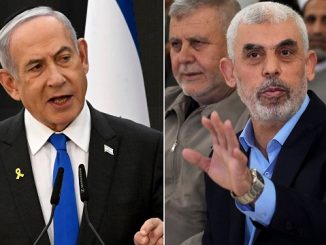
US ’s capital, senior administration officials have said.
He is due to announce the controversial decision in a speech later.
Mr Trump is also expected to approve moving the US embassy from Tel Aviv to Jerusalem, but not for several years.
Israel welcomes the changes but the Palestinians and Arab leaders have warned they will jeopardise any Middle East peace process.
The Palestinians’ UK representative, Manuel Hassassian, told the BBC the changes would be the “kiss of death” to the two-state peace solution and amounted to declaring war in the Middle East.
Israeli Prime Minister Benjamin Netanyahu has yet to comment officially but Education Minister Naftali Bennett called on other countries to follow Washington’s lead.
“Jerusalem has been and always will be the eternal capital,” he told the Jerusalem Post Diplomatic Conference.
Pope Francis called for the “status quo” to be respected. Dialogue would only come through “recognising the rights of all people” in the region, he said.
And UK Foreign Secretary, Boris Johnson, said he viewed the reports of what Mr Trump would say “with concern”.
Israel has always regarded Jerusalem as its capital city, while the Palestinians claim East Jerusalem as the capital of a future Palestinian state.
In recognising Jerusalem as Israel’s capital, the US becomes the first country to do so since the foundation of the state in 1948.
What is so contentious about Jerusalem’s status?
The issue goes to the heart of Israel’s conflict with the Palestinians, who are backed by the Arab and wider Islamic world.
The city is home to key religious sites sacred to Judaism, Islam and Christianity, especially in East Jerusalem.
Israel annexed the sector from Jordan after the 1967 Middle East war and regards the entire city as its indivisible capital.
According to the 1993 Israel-Palestinian peace accords, its final status is meant to be discussed in the latter stages of talks.
Israeli sovereignty over Jerusalem has never been recognised internationally and all countries maintain their embassies in Tel Aviv.
Since 1967, Israel has built a dozen settlements, home to about 200,000 Jews, in East Jerusalem. These are considered illegal under international law, though Israel disputes this.
In recognising Jerusalem as Israel’s capital, the US could reinforce Israel’s position that settlements in the east are valid Israeli communities.
What is the US proposing?
Trump administration officials said recognising Jerusalem as Israel’s capital was seen as “a recognition of reality” by the US government.
However, specific boundaries of the city would remain subject to a final status agreement, the official said. The status of holy sites would not be affected.
Mr Trump would also direct the state department to begin the process of moving the US embassy to Jerusalem – but this could take several years as it still has to be designed and built and security concerns would need to be addressed.
He originally promised the move to pro-Israel voters during his campaign for the presidency.
The US officials added that the president would still sign a regular waiver blocking the embassy’s move from Tel Aviv to Jerusalem until the new building was completed.
Successive presidents have signed waivers, officially on security grounds, to get round the 1995 Jerusalem Embassy Act, which mandates moving the embassy.
Mr Trump has vowed to pursue a peace agreement between Israelis and Palestinians, led by his son-in-law and top adviser Jared Kushner.
An administration official said the new US policy on Jerusalem was not designed to favour Israel in that process.
What other reaction has there been?
- Saudi Arabia, an ally of the US, called the new policy “a flagrant provocation to Muslims”
- Hamas leader Ismail Haniya called for protests this Friday
- China warned against escalating tensions in the Middle East
- Jordan’s King Abdullah said the decision would “undermine efforts to resume the peace process”
- Egypt’s President Abdul Fattah al-Sisi urged Mr Trump “not to complicate the situation in the region”
- Turkey’s President Recep Tayyip Erdogan said on Tuesday his country could sever ties with Israel
US government employees and their families have been barred from personal travel in Jerusalem’s Old City and the West Bank for security reasons ahead of expected protests.
Israel’s intelligence minister Israel Katz told Army Radio that Israel was “preparing for every option”, including an outbreak of violence.
France, the European Union and the Arab League have also expressed concern.
No sign it’s a bargaining chip
Analysis by Barbara Plett-Usher, state department correspondent, BBC News
By recognising Jerusalem as Israel’s capital President Trump is fulfilling a campaign promise. There is no other obvious reason he is doing this now.
Administration officials said he would simply be acknowledging reality – that Jerusalem functions as Israel’s capital. They said the decision would not determine final status issues such as boundaries and sovereignty – that is still left to negotiations.
On other core issues of the Israeli-Palestinian conflict, Arab and Muslim leaders may be able to work with changes in the US approach but Jerusalem is also holy land, not just a disputed capital.
Jordan and Saudi Arabia are custodians of Islam’s holy sites and have issued strong warnings that this move could inflame the Muslim world.
There is also no indication that this is a bargaining chip to advance the peace process: according to the officials, President Trump is not expected to publicly endorse a two-state solution.
It sounds like the Palestinians will get nothing. Perhaps there is a wider strategy at work but it looks like a workaround so the president can satisfy his pro-Israel voters.
Source: bbc.co.uk






Be the first to comment